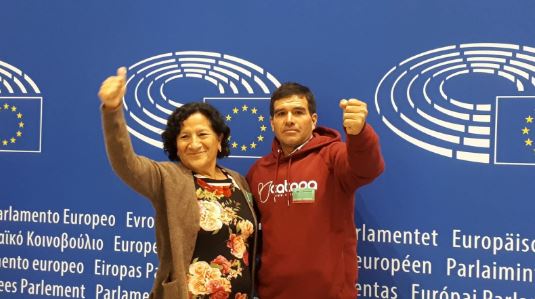ENVIRONMENTAL DEFENDERS, INDIGENOUS REPRESENTATIVES OF COMMUNITIES AFFECTED BY MINING MEET WITH MEP’S REGARDING EU DUE DILIGENCE LEGISLATION
Our Peruvian environmental defenders, alongside indigenous representatives from Russia and Guatemala, met with MEP’s on Thursday 4th March to share their stories of fighting on the frontlines to defend their communities from destructive mining projects.
International voluntary standards on responsible corporate conduct have failed to have an impact on environmental and human rights abuses along supply chains.
They demanded tougher battery and due diligence legislation that centres the voices and experiences of impacted communities. Under the ‘social licence to operate’ (SLO), a non-binding voluntary commitment to ‘good practice’, corporations are able to greenwash their operations. International voluntary standards on responsible corporate conduct have failed to have an impact on environmental and human rights abuses along supply chains.

The delegation emphasised the importance of retaining copper, bauxite and iron within proposed due diligence obligations. They also brought attention to the need to include obligations towards climate impacts.
Current Corporate Sustainability Due Diligence proposals only require EU mining companies with more than 250 employees and an annual turnover of 40 million euros to prevent human rights and environmental abuses along their supply chains. This applies to less than 0.2% of EU companies.
Companies will also only be required to prevent the impact of so-called ‘established’ business partners. This fails to cover short-term relationships, incentivising companies to regularly switch suppliers to avoid liability.
The proposed law also fails to remove serious legal hurdles that prevent transnational cases being brought against companies, such as costs, short time-limits, lack of access to evidence and a disproportionate burden of proof.

Beyond corporate sustainability, our environmental defenders pushed for a fundamental transformation of our society and relationship with nature. Our current linear model of consumption and production is a driving cause of the climate crisis. In this “throwaway” model, the pursuit of limitless growth, production and consumption are destroying our biodiversity, polluting our rivers and killing those who defend us.
Overconsumption in the EU is directly tied to destructive mining projects in Peru and Latin America. The EU’s material footprint is 14.5 tonnes per capita (of which 20% is imported from outside of the EU). This is double the just limit of consumption and is using up to 97% of the planet’s ‘safe operating space’.
After visiting the EU Parliament, our environmental defenders met with other indigenous representatives, CSOs and MEPs for dinner to build and strengthen links of solidarity between their fights for justice.
This meeting occurred in collaboration with the EEB, as part of the Speaker’s Tour 2022.
Written by catapista Connor Cashell.
Sources:
Business and Human Rights Centre Resource Centre., (2019). Brumadinho dam collapse: lessons in corporate due diligence and remedy for harm done. Available at: https://www.business-humanrights.org/en/blog/brumadinho-dam-collapse-lessons-in-corporate-due-diligence-and-remedy-for-harm-done/ [Accessed 22 March 2022]. Cockburn, H. (2020) ‘Climate crisis: global temperature rise of 2C ‘would release billions of tonnes of soil carbon’, Independent, 2 November 2020. Available at: https://www.independent.co.uk/climate-change/news/soil-carbon-climate-crisis-global-warming-b1534409.html [Accessed 22 March 2022]. European Commission (2021) ‘Proposal for a Directive of the European Parliament and of the Council on Corporate Sustainability Due Diligence and amending Directive (EU) 2019/1937’. Available at: https://ec.europa.eu/info/sites/default/files/1_1_183885_prop_dir_susta_en.pdf [Accessed 22 March 2022]. European Environmental Bureau, Friends of the Earth Europe (2021). Green mining is a myth’: the case of cutting EU resource consumption. Available at: https://eeb.org/wp-content/uploads/2021/10/Green-mining-report_EEB-FoEE-2021.pdf [Accessed 22 March 2022]. MEP Antonius Manders (2021), Report on the liability of companies for environmental damage (2020/2027(INI)) Committee on Legal Affairs. Available at: https://www.europarl.europa.eu/doceo/document/A-9-2021-0112_EN.pdf [Accessed 22 March 2022]. OECD (2011), Guidelines for Multinational Enterprises (2011 update), Available at: https://doi.org/10.1787/9789264115415-en [Accessed 22 March 2022]. United Nations (2011), Guiding Principles on Business and Human Rights: Implementing the United Nations ‘Protect, Respect and Remedy’ Framework. Available at https://www.ohchr.org/Documents/Publications/GuidingPrinciplesBusinessHR_EN.pdf [Accessed 22 March 2022].




